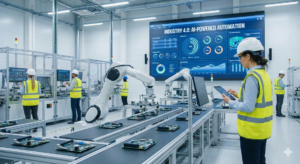Music Generated by Artificial Intelligence: Creativity or Code?

Music Generated by Artificial Intelligence: Creativity or Code?
Within the realm of the music industry, a revolutionary new sound
Composing music is currently one of the many applications of artificial intelligence (AI), which is no longer limited to data analysis, robotics, or automation of tasks. Technology is transforming the way we consume and generate music in a variety of ways, including the ability of streaming platforms to suggest songs and create unique tunes using artificial intelligence algorithms. However, this development brings up an essential question: is music made by artificial intelligence the result of creative effort, or is it merely the consequence of skilled programming?
AI-Generated Music: What Does It Mean?
Compositions that are developed with the assistance of algorithms that have been trained on vast datasets of previously recorded songs are referred to as AI-generated music. After conducting an analysis of melody, harmony, rhythm, and structure, these algorithms generate new compositions that imitate certain musical styles, moods, or even the musical styles of particular performers. Popular artificial intelligence technologies like AIVA, OpenAI’s MuseNet, and Google’s MusicLM are able to create a wide variety of musical compositions, ranging from classical symphonies to contemporary pop singles.
How Artificial Intelligence Produces Music
This is the normal procedure that includes:
- A massive volume of music is fed into the artificial intelligence in order for it to understand patterns.
- Models of machine learning include the use of neural networks, particularly recurrent or transformer-based designs, in order to comprehend the structure of musical compositions.
- Creating sequences of notes, chords, and rhythms that come together to make an original work is what is meant by the term “content generation.”
- A polished sound is achieved by post-processing, which includes the addition of production effects, mixing, and mastering.
An Argument in Favor of Creativity
1. Increasing the Number of Musical Possibilities
AI is capable of combining musical styles and genres in ways that human composers may not even consider, resulting in combinations that are surprising and novel.
2. Increasing Access to Music Production for All
Using AI techniques, even those who have not had any professional instruction may produce music of a high quality. This makes it easier for people to enter the sector and enables a wider variety of viewpoints to be heard inside it.
3. Motivating Human Musicians to Perform
The employment of artificial intelligence by musicians as a collaborating partner may result in the generation of ideas or variants that ignite new creative paths.
An Argument in Favor of the “Just Code”
1. An absence of emotional motivation
Artificial intelligence is capable of imitating emotional expressions, but it does not feel emotions herself. There are many people who believe that genuine creativity needs actual human experience.
2. Pattern Reproduction
Considering that artificial intelligence (AI) creates music based on patterns it has learnt, the issue arises as to whether or not it is really producing anything new or only rearranging parts that already exist.
3. Possibility of being homogenized
An excessive dependence on material supplied by artificial intelligence might result in music that produces a more homogeneous sound, so diminishing the variety of cultural and individual expression.
Copyright and Legal Obstacles to Overcome
A song that was written by artificial intelligence belongs to the user, the developer, or no one at all. Different nations have different laws, and in many of them, human authorship is required for copyright protection. Because of this, there is a lack of clarity on the legal implications of their commercial usage.
- Implications for the Music Industry Shorter turnaround times and reduced prices for the composition of soundtracks, jingles, and background music are two of the effects that music production has had.
- More affordable studio sessions are available to independent artists, allowing them to have greater access to compositions that sound really professional.
- While mainstream artists have the opportunity to experiment with new sounds, they also face pressure from competition that is created by artificial intelligence.
- Real-World Examples There have already been albums published that were helped by artificial intelligence, and some listeners are unable to differentiate them from music that was created by humans.
- The application of artificial intelligence allows gaming firms and film studios to build adaptable soundtracks that alter in real time depending on the activities of players or the progression of the storyline.
The Future: Working Together Instead of Replacing Each Other
Analysts believe that the most fruitful use of artificial intelligence in the field of music will be as a creative helper, rather than as a substitute for human artists. Artificial intelligence is capable of handling activities that are monotonous or technical, freeing people to concentrate on emotions, narrative, and personal expression.
Matters with Ethical Implications
In the process of artificial intelligence becoming capable of imitating the styles of great artists, ethical concerns are emerging around imitation, cultural appropriation, and consent. In order to safeguard both listeners and artists, it will be necessary to establish clear criteria.
Striking a Balance Between Art and A Computer Program
At the point where creativity and computation meet, artificial intelligence-generated music may be found. Although it is capable of producing compositions that are both creative and of high quality, it does not possess the lived experience and emotional depth that are characteristic of human talent. There is a good chance that the future of music will be molded by a collaboration between human creativity and the precision of machines, in which coding will serve to promote creativity rather than just replace it.




